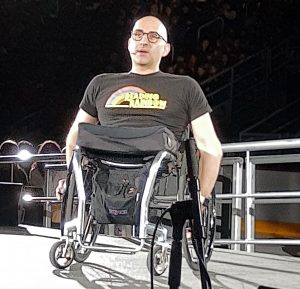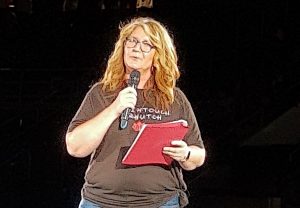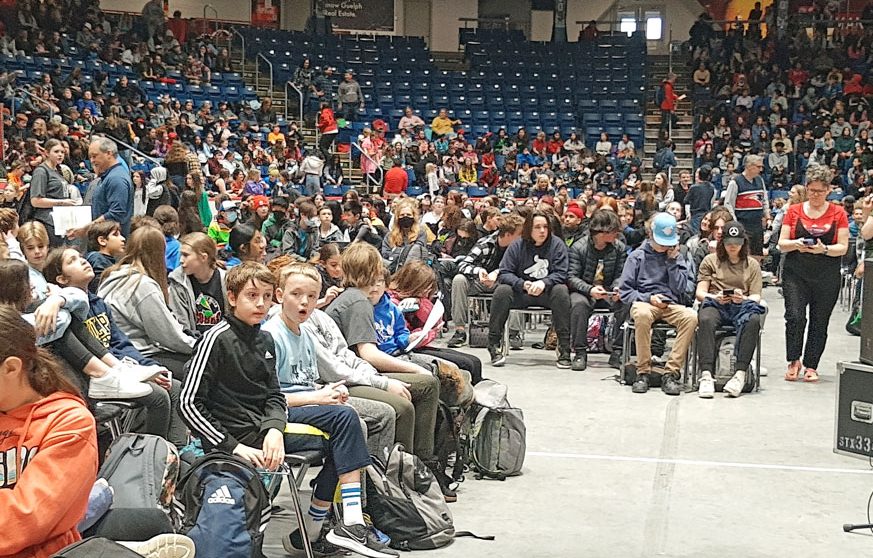GUELPH – Thousands of students and educators with the Upper Grand District School Board (UGDSB) flocked to the Sleeman Centre on May 4 for a day of uplifting stories, positive thinking, and the overwhelming message that there is no wrong time to do good in the world.
In fact, the theme of the event was: “Why not now?”
“That was the motto for the day,” said Andy Speers, a teacher at Elora Public School and the behind-the-scenes organizer of the event.
“There are lots of great things happening in this world. It’s nice to focus on the positive.”
Empowerment Day was started nine years ago by the student council at Drayton Heights Public School – a response to the fact that We Day was becoming huge and yet a limited number of UGDSB students were allowed to attend.
Speers said when the event was held in Waterloo, 25 Upper Grand students could attend; when it moved to Toronto, only eight could go.
“There were a lot of students who wanted that leadership opportunity, but they were kind of left on the sideline,” Speers said. “Two of my students wondered if we could do our own and I said, ‘Yes, we can.”
Elora Public School began organizing empowerment Day in 2015 and 1,000 UGDSB students attended. During the pandemic, the event moved to a virtual format, and this year marked a return to the in-person event.
And it broke all the records.
About 5,500 students and educators attended, four speakers told stories of overcoming adversity, and the musical group Choir! Choir! Choir! wrapped up the day with a performance Speers called “a full-blown rock show.”
The day began with a tribute to Addison Hill, the 14-year-old Elora girl who died of cancer last year but with the support of Team Addy behind her, raised more than $200,000 for Toronto’s Sick Kids hospital.
Spencer West

Spencer West was among the speakers at Empowerment Day on May 4 at the Sleeman Centre in Guelph. Some 5,500 students and educators attended.
Photo by Joanne Shuttleworth
Spencer West was the first speaker. He was born with a genetic illness and lost his legs at age 2.
Doctors didn’t expect he’d have much of a life, but his family and friends were determined he would be more than his disability.
In high school, in the U.S., he joined the cheerleading squad, and they won the state championship – a victory that elevated cheerleading as a sport in his school.
“That was the first time I realized I could make a difference and that was so important to me,” West said.
He worked in the communications field for many years, but in 2007 decided he wanted to do more than live a comfortable life. He wanted adventure and he wanted to make a difference.
In 2012 he and some friends climbed Mount Kilimanjaro – the highest mountain in Africa – to raise money for a program to bring water to communities in Kenya.
He was pushed in his wheelchair some of the way, but he also dragged himself up with his hands. And he motivated his friends to complete the summit too.
What did he learn?
“I realized I can make a difference. I can use my story to challenge people to look at life differently,” he said.
“What does this mean for you? We all have a responsibility to give back. So find your thing; focus on that thing; and find the team to help you do it.”
Myrna Hutchinson

Myrna Hutchinson spoke about the suicide of her son Steven and how people all need to be more honest and open about how we are feeling. Photo by Joanne Shuttleworth
Myrna Hutchinson, of Arthur, spoke about losing her son Steven to suicide in 2013 and the organization she started afterward, Get In Touch for Hutch.
Hutchinson said she had no idea her son was struggling so deeply before he died, and she encouraged youth to speak about their feelings and let someone know if they are struggling.
“People can look fine, but we never know how they are doing on the inside,” she said.
And we all say we are fine, even if we’re not.
“We have to stop worrying about what people think about us. Share kindness. Say thank you. And practice finding your words,” she said. “Use your voice – especially on days when you are not feeling so fine.”
Clara Hughes
Clara Hughes won gold, silver and bronze medals at the Olympics in cycling and speedskating and with them a huge circle of adoring fans.
But no one knew of Hughes’ mental health struggles until she started speaking openly about it. And it was through that journey of talking and reflecting on her life that she found a healing path, she said.
Her father struggled with alcoholism, her mother had a mental illness, and her sister was bi-polar. As a kid, Hughes said she felt she had to fix the problems in her family and when she couldn’t, she began to zone out with drugs and alcohol.
“It helped me to not feel,” she said.
By 17 she had all but dropped out of high school. But she also saw the winter Olympics, held in Calgary that year, and was mesmerized by speed skating.
She decided she wanted to be an Olympic athlete, “and I changed. I became an eating, sleeping, training machine,” she said.
“On the outside I looked good, but I was not fine because I was the same person inside. I felt worthless, a failure, and it was all my fault,” Hughes said.
Cycling was more available to her than speed skating, so she took up cycling and in her first Olympic games, she won two bronze medals.
“But I still felt like nothing,” she said.
It was a doctor at training camp who first talked about her mental health, and she realized she needed to take time to work on that. So, she stepped back from Olympic sports.
“I had to train in a different way,” she said. “I needed to work on my mental health as much as my arms and legs.”
At age 27, she returned to speed skating. With a healthier mind, she was almost invincible, winning bronze at the Salt Lake City Olympics and gold and silver in Italy.
She now speaks on Bell’s Let’s Talk mental health days and works with the Right to Play organization, which promotes healthy sports for children around the world.
Orlando Bowen
Orlando Bowen played for the Toronto Argonauts and the Hamilton Tiger-Cats from 2000 to 2004 but his football career was cut short after an altercation with police where he suffered a head injury.
Bowen was waiting for friends in a parking lot when he was approached by two police officers who accused Bowen of dealing drugs.
They beat him and he suffered a severe concussion which ended his football career.
He was exonerated of wrongdoing and one of the officers was later arrested and charged with possession and trafficking cocaine.
But Bowen was left to put the pieces of his life back together, eventually founding the One Voice One Team youth leadership organization.
Bowen speaks about finding your voice and speaking out when you see something wrong.
“He came out like a ball of energy, and you could have heard a pin drop when he was talking,” Speers said.
Choir! Choir! Choir!
Choir! Choir! Choir! specializes in turning its audience into a choir and before the day was done, students were singing harmonies to Don’t Stop Believing, We Will Rock You, and the theme song from Friends.
“Most of us would not want to sing like that in public. They pushed us out of our comfort zone. And it was epic,” Speers said.
“The kids left the stadium just jumping and energized.”
Speers said participating teachers had developed lesson plans around the messages of the speakers, so it wasn’t all new information for students to process.
And there will be follow-up lessons from those take-away messages too.
Students “were hearing topics that can make us feel awkward. But we do our best learning outside out comfort zones,” Speers said.
“There’s nothing more powerful than being at a live event.”
Speers said he’s grateful to the event sponsors – local Optimist clubs, Get In Touch for Hutch, the UGDSB, IG Wealth Management, and Give Some.




